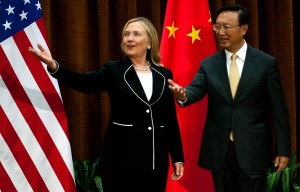
US Secretary of State Hillary Rodham Clinton, left, meets with Chinese Foreign Minister Yang Jiechi, at the Ministry of Foreign Affairs in Beijing Tuesday. Clinton is in Beijing to press Chinese authorities to agree to peacefully resolve disputes with their smaller neighbors over competing territorial claims in the West Philippine Sea. AP
BEIJING – China promised Wednesday to ensure freedom of navigation in the tense South China Sea and told Secretary of State Hillary Clinton it was willing to work on a code of conduct to manage disputes.
After weeks of escalating tensions in the strategic sea and a war of words between Washington and Beijing, the Pacific powers toned down the rhetoric and pledged cooperation as Clinton met with most of China’s top leadership.
“Freedom and safety of navigation in the South China Sea is assured,” Yang told a rare joint news conference with Clinton inside the imposing Great Hall of the People.
“For China and our neighboring countries, the South China Sea is really a lifeline for exchanges, trade and commerce. There is no issue currently in this area, nor will there ever be issues in that area in the future,” he said.
His assurances may be met by scepticism from neighboring countries such as the Philippines and Vietnam, which have accused China of carrying out a campaign of intimidation as its economic and military clout grows.
The United States has rallied behind the Southeast Asian nations and sharply criticised Beijing’s recent establishment of a remote garrison in the South China Sea, through which half of the world’s cargo flows.
Yang said that China had “plentiful historical and jurisprudential evidence” for its claims to virtually all of the South China Sea, a position that has led Beijing to consider much of the disputed areas to be within its own waters.
But he sounded upbeat on Clinton’s calls for an eventual code of conduct in the South China Sea, which would establish rules and means of dialogue to prevent maritime incidents from escalating into full-fledged conflict.
Pointing to his recent tour of several Southeast Asian nations, Yang said that China agreed to “work towards an eventual adoption of a code of conduct” on the basis of consensus.
Yang said without elaborating that he hoped for “success” at the East Asia Summit in November in Cambodia. Clinton has said that she wanted to see progress on the code in time for the summit after talks in July by Southeast Asian foreign ministers failed to make headway.
Clinton, who met Yang for a dinner Tuesday that stretched past midnight, said it was “in everyone’s interest” for China and the 10-member Association of Southeast Asian Nations to seek a code of conduct.
She denied charges that the growing US military and political focus on Asia was aimed at containing China, saying that President Barack Obama’s administration did not want “unhealthy competition”.
“Both President Obama and I have said frequently that the United States welcomes the rise of a strong, prosperous and peaceful China,” she said.
The show of conciliation stands in marked contrast to the tone of China’s state-run press which has ripped into the United States nearly daily ahead of Clinton’s visit.
Just as Clinton was meeting Chinese leaders, the overseas edition of the People’s Daily warned Wednesday against the United States “sowing discord” among China’s neighbors, calling such a strategy “a counterproductive waste”.
Yang, asked if he shared the dire media assessments of US intentions, said: “Nowhere else do China and the United States share more converging interests and interact more frequently than in the Asia-Pacific region.”
Clinton met President Hu Jintao and much of the top leadership but Vice President Xi Jinping — who is expected to take power next year — called off talks at the last minute.
While China has in the past used abrupt cancellations to show displeasure, the two sides played down the absence of Xi, who made friendly gestures during a visit to the United States earlier this year.
Yang warned against “unnecessary speculation”. A US official said that Xi planned to send a letter to Clinton and that she would likely meet later with someone else involved in the leadership transition.
Clinton’s last visit to China in May was overshadowed by a row over blind dissident Chen Guangcheng, who dramatically escaped house arrest for the safety of the US embassy. China eventually allowed him to move to New York to study.
Clinton pointed to human rights as she said that the United States and China “do not always see eye to eye” on all issues. Concerns have mounted over China’s treatment of Tibet which has seen a wave of self-immolations.